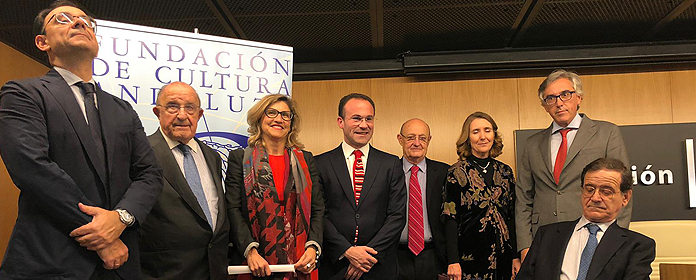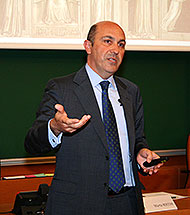Gonzalo Herranz denounces that the weak are victims of researchers' utilitarianism
University specialist criticizes the "ethical dullness" and believes that the biomedical field must free itself from industry control over clinical trials.
"A very urgent challenge facing the ethics of medicine today is to recover respect for the human being, for all human beings. The weakest - the poor, the embryos, the elderly - continue to be victims of the utilitarianism of many researchers". This is the opinion of Dr. Gonzalo Herranz, professor at department of Humanities Biomedical of the University of Navarra, who is participating in the course on the Ethics of Biomedical research held at campus in Pamplona.
According to this Full Professor, "it is currently considered correct and advanced to say that the life of certain human beings lacks quality and that it can be eliminated for the comfort and benefit of the strongest". For this reason, he stressed the need to awaken the critical sense of researchers: "Many blindly believe in science and in bioethics that presents itself as advanced and 'progre', and say that experimental science will save man. They take it for granted that to solve the ethical problems of medicine it is enough to use the 'all-purpose toolbox' of the four principles. They speak of colonizing Mars, of working miracles with embryonic cells, of expanding human intelligence...". In his opinion, "this subject of scientism provokes in people a kind of ethical dullness".
Recognizing patient rights and admitting medical errorsDr. Herranz, vice-president of the European Doctors' Ethics Commission, believes that medical ethics and law have an immense creative program ahead of them: "It would be based on restoring respect for the weak, dignifying human relations in hospitals, giving sincerity to patients' bills of rights, admitting medical errors not as something inevitable but as something to be learned from. It would also focus on other aspects, such as setting reasonable and fair limits to the medical expense ".
For this expert, however, medical ethics today has a consoling balance, since it has already corrected many abuses: "With ethics committees committed to the protection of human beings, there should be no abusive research ". But its members "can also succumb to the scientistic temptation. Thus, they have C projects with the alibi, for example, that the poverty of sub-Saharan African countries makes it possible to authorize programs of study that would be considered criminal in the USA or Europe, or that human embryos do not deserve the same respect as children".
According to this professor at the University of Navarra, the greatest abuses "come from the power of the industry, which determines what clinical trials are done and how. And, above all, their control over the publication of research results. In his opinion, "science is thus very tainted and subjected to commercial interests. It is no longer pure knowledge.
The course on ethics in biomedical research covers topics such as informed consent, the handling of human biological samples or the use of animals in the research. The director of the department of Humanities Biomedical and manager of this course, Pilar León, stressed that "in Spain we are becoming aware of the importance of research which, in addition to being a requirement of health institutions, is considered a social imperative. Health centers and research need trained people to be included in their ethics committees and this program aims to meet this need".


